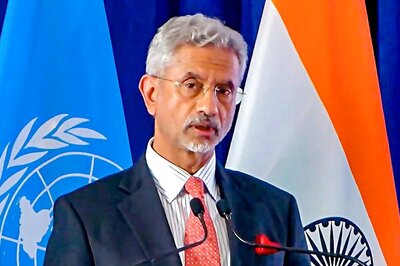
views
India and Maldives’ Ties Are Back on Track: Can New Delhi Achieve the Same in Bangladesh?
India faces a challenge in its immediate neighbourhood. There appears to be a concerted effort underway by certain powers to turn the larger subcontinent against India. When India’s ties with the Maldives nosedived earlier this year, it was largely believed that New Delhi had lost another regional ally to China.
The genesis of India’s trouble in Maldives can be traced back to the ascent of Mohamed Muizzu as the country’s president. Famous for his pro-China outlook and “India Out" plank, his electoral win played a critical role in New Delhi’s ties with Male going on a rapid downward spiral. However, there are now signs that the bilateral relationship is back on track. A lot of it has to do with Muizzu’s course correction at home, and of course, India’s deft diplomacy.
Last week, India’s External Affairs Minister, Dr S Jaishankar was on a three-day visit to the Maldives. As it turns out, this proved to be quite a fruitful visit – one marked by India taking its United Payments Interface (UPI) to the Maldives and also picking up major developmental projects in 28 Maldivian islands. While Jaishankar said that the archipelago nation is not an ‘ordinary neighbour’ to India, President Muizzu returned the favour by saying that he was committed to deepening the India-Maldives relationship. Muizzu has reportedly also pitched the idea of a Free Trade Agreement between both nations to further bolster their trade partnership.
Maldives’ recalibration has a lot to do with its mounting debt crisis. If there is one fact known to all in the region, it is that benevolent Chinese loans which may seem difficult to resist in the short term have the ability to trap entire nations in the long run. The Maldives is no exception to this understanding. It witnessed first-hand the chaos which unfolded in Sri Lanka in 2022.
Over the past decade, the Maldives has borrowed around $1.5 billion from the Chinese, which now makes up 20 per cent of its public debt. Beijing has announced a mere $50 million write-off in loans for Male. On the other hand, India has extended budgetary support of nearly $50 million, while also increasing the export quotas of essential commodities to the Maldives. This is besides the $220 million invested by India for the development of the archipelago.
India has handled the Maldivian fiasco quite well. Whatever messaging was undertaken behind the curtains has certainly paid off. President Muizzu is visibly stepping back from his anti-India stance. All in all, Indian diplomacy has paid off in the Maldives. The question is, can India do the same with Bangladesh?
Replicating the Maldives Model with Bangladesh
The tumult in Bangladesh following Sheikh Hasina’s ouster from the country has naturally sent alarm bells ringing in New Delhi and the wider Indian strategic commentariat. The base understanding of the situation, as it stands now, is that India will have to venture into unchartered territory and possibly face a hostile regime in Bangladesh that is indifferent to New Delhi’s strategic concerns, if not outrightly antagonistic to them.
This is where I disagree. It would be grossly premature to suggest that India has comprehensively lost in Bangladesh and that the situation can no longer be salvaged. While the overthrow of Sheikh Hasina does indeed represent a strategic setback for New Delhi, to say that all is lost would be an underestimation of India’s diplomatic prowess and all that it has been able to achieve over the past decade.
Already, there are signs that the interim government of Bangladesh, led by Muhammad Yunus, is not interested in antagonising New Delhi. Although the Bangladesh Nationalist Party (BNP) has said that Hasina’s stay in India could make it difficult for both countries to mutually cooperate with each other, the interim government’s position is polarly opposite. Youhid Hossain, the interim government’s Foreign Affairs Adviser, on Monday said that Hasina’s extended stay in India would not hurt India and Bangladesh’s bilateral ties. He also said that the country will always try to maintain good relations with New Delhi. This, when read with Yunus’ calls to cease violence against Hindus provides both Dhaka and New Delhi with a foundation to start building ties from.
Read more: Straight Talk | With Sheikh Hasina Out, Three Winners Emerge in Bangladesh: China, Pakistan and US
Bangladesh understands the criticality of India to its own strategic interests and even security. It is dependent on India for many essentials, including wheat, sugar, rice, vegetables and fruit. The garment industry sources raw materials, especially cotton from India. Besides, Bangladesh also sources significant electricity from India. India is the second-largest trading partner for Bangladesh in Asia after China. For any Bangladeshi government concerned about the country’s national and strategic interests, antagonising and alienating India cannot even be a remote possibility. However, the same cannot be said about certain sections of Bangladesh’s polity.
A lot now depends on the functioning of the interim government in Bangladesh, and whether they can create a scenario where the people do not see the necessity of bringing in the likes of BNP or the Jamaat-e-Islami to power. With such parties in power, India will definitely face a challenge navigating ties with Bangladesh. One might argue that India will even be forced to take stern measures to protect its own interests. That being said, the BNP must itself realise that India is a major player in the region, since its own interests are at stake. Creating an enemy out of New Delhi will serve no practical purpose for the BNP and its radical allies. Instead, such parties must act with prudence and ensure Bangladesh does not become a breeding ground for elements inimical to India.
Again, it is Indian diplomacy that must now do the heavy lifting. Although the ball is now in Bangladesh’s court, India must use the full might of its diplomatic prowess to impress upon the new leaders in Dhaka that making an enemy out of its closest friend is not in the interest of Bangladesh. If push comes to shove, there are many pressure points and levers that India can fiddle around with to drive its point across. Beyond a point, these may not necessarily be diplomatic measures alone. After all, Bangladesh does find itself surrounded by India from all sides. Unless Bangladesh wishes to become the next big victim of China’s debt-trap policy, it will take sincere measures to maintain a healthy relationship with India.
Views expressed in the above piece are personal and solely that of the author. They do not necessarily reflect News18’s views.





















Comments
0 comment